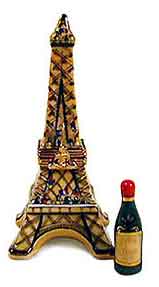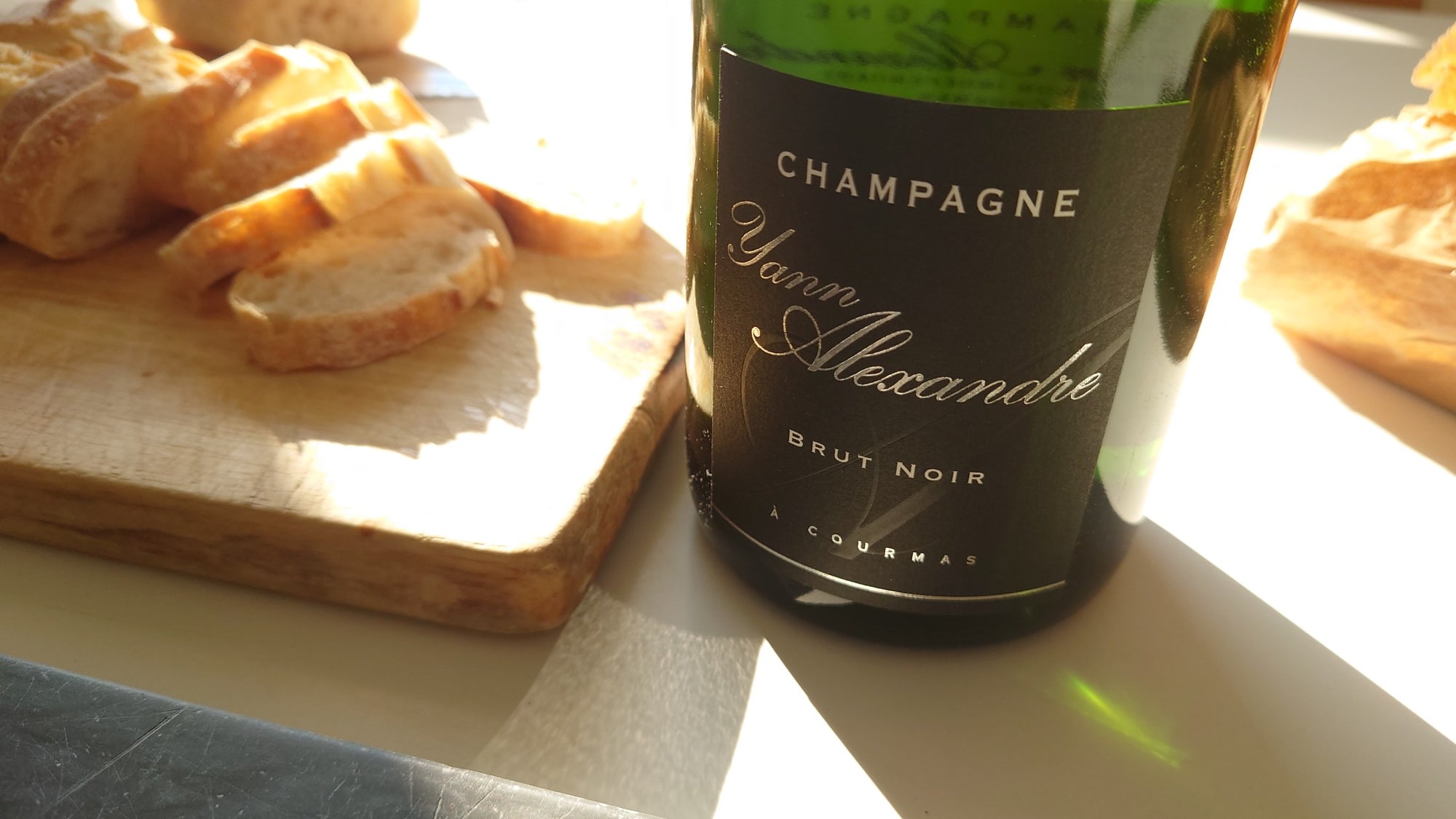 Warning: Irony alert! Items in
Warning: Irony alert! Items in red italics are used ironically. Please don't send any more hate mail. I love the French, French wine and French food. Period.
Much of the press for the French wine industry has been pretty negative lately. They lost the reenactment of the famous 1976 France vs. USA tasting. They can't sell all the wine they produce. Australia is killing them on marketing. Etc. etc. Let's face it: those
cheese eating surrender monkeys just don't get it.
Thank God.
Not that I know exactly what “it” is but I think it's along the lines of being able to savvily market cheap plonk. I'm very happy that these difficult people in the land of
au contraire think differently. We in the land of short memories forget just how indebted the New World is to the French wine industry.

Just as the English Language is mainly derived from French, new world wine making is perhaps more so. When the great 19th Century French author and bon vivant Alexander Dumas (erroneously known as “dumb ass” to those who saw the Shawshank Redeption) was learning English, he picked up an English book, noticed all the similarities and remarked “English is all French”. Actually 60% of the English Vocabulary comes from French. The situation is perhaps more so in wine. Let's face it: 50 years ago France (and to a much smaller extent, Germany) was where the world looked for anything beyond vin de table or fortified wines. To better their own industries, new world winemakers adopted the grape varieties and techniques of really just one country: France. Almost all fine winemakers want French oak barriques. The world's best known grape varieties – Chardonnay, Sauvignon Blanc, Pinot Noir, Merlot, Cabernet Sauvignon and Syrah – are all French.
So even if they are too arrogant to market themselves properly, the French are still on the forefront of fine wine making in many ways:
Dirt Not soil but dirt. The French are at one with dirt. Only one in 10 of them
regularly uses soap. Hygienic Americans like myself are terrified of germs and shudder at such satistics but I still like stinky cheese and more than a dollop of earthiness in my wine. To make squeaky clean wines is to forgo a big stinky chunk of any winemaker's bag of tricks.
Untech There is a great deal of technology out there to help make better wine easier but (mostly) the French just don't buy it. No, monsieur! And not just the organic or biodynamic growers but among a broader group of winemakers that believe that less intervention is better; as in no packaged yeasts, no filtering and very little new oak, etc. to produce a more natural wine. This is a trend that many high quality New World winemakers have already embraced which seems only natural when you consider wine as a food instead of a lethal weapon.
 Multiplicity
Multiplicity People often pooh-pooh the French for not drinking the wines of other countries. To say that there are over twice as many Appellations in France as in California is to grossly underestimate the vast variety of French wines and winestyles. There are over 153,000 growers in France and over 110,000 of these make there own wine. Add to that the regional traditions in which they operate as opposed to global market forces and you have the enormous great wine selection that is France. Sorry California but If I could drink wine from only one country for the rest of my life, France would be number one on my list (with Italy second).
Bargains Why a good grower produced Languedoc or South West France wine costs less than a mediocre industrial Californian or Australian baffles me. Maybe it's because they spend less money on marketing.
Stupid frogs!
Acid Food friendly wines - which usually means higher acidity and lower alcohol – are at a distinct disadvantage when it comes to wine scores, where the big fellas out flavor everyone and bring home the medals. The French are pretty much immune to wine scores (unless you're a Bordeaux Négociant!) and would rather find a great match to the food they're serving. A wine paradox exists in the US: everyone seems to fall for high scoring wines while simultaneously concerned about food pairings. In fact, most of the questions average wine drinkers have about wine concerns food pairing more than anything else. Hopefully, perhaps naively food friendly wines will trump high scoring wines
Soil Since there is no easy English translation for the French word terroir that means the “placeness” or environmental factors such as soil type, drainage, amount of sunlight, etc. many people find this term annoying. Actually “microclimate + soil” comes pretty close. Anyway you say it, a regional emphasis on wines is now sweeping the globe. No one wants to be commodified as Chiliean Merlot or Australian Shiraz anymore as in I'll have a glass of the McClaren Vale and a Maiopo Valley for the little lady thank you very much. Like it or not the future of wine marketing is by regions not unlike the way the French do it.
Subtlety When a delicate wine falls in the forest of thermonuclear fruit bombs does anyone hear it? No. Sorry but no. Delicate wines literally aren't going to win anyone points, but hopefully the tide will change. The only sommeliers that seem to suggest delicate wines over big wines seem to all be French. Quite possibly it's a sophisticated insult that I'm a girly man but I choose to think otherwise.

Of course there are plenty of tres horrible French wine out there -- like Rene Junot (which would easily take the chrome off just about anyone's fender) – but overall it seems that they're are headed in the right direction with the rest of the world begrudgingly following.
Vive la France! Vive la Difference!
 Warning: Irony alert! Items in
Warning: Irony alert! Items in  Just as the English Language is mainly derived from French, new world wine making is perhaps more so. When the great 19th Century French author and bon vivant Alexander Dumas (erroneously known as “dumb ass” to those who saw the Shawshank Redeption) was learning English, he picked up an English book, noticed all the similarities and remarked “English is all French”. Actually 60% of the English Vocabulary comes from French. The situation is perhaps more so in wine. Let's face it: 50 years ago France (and to a much smaller extent, Germany) was where the world looked for anything beyond vin de table or fortified wines. To better their own industries, new world winemakers adopted the grape varieties and techniques of really just one country: France. Almost all fine winemakers want French oak barriques. The world's best known grape varieties – Chardonnay, Sauvignon Blanc, Pinot Noir, Merlot, Cabernet Sauvignon and Syrah – are all French.
So even if they are too arrogant to market themselves properly, the French are still on the forefront of fine wine making in many ways:
Dirt Not soil but dirt. The French are at one with dirt. Only one in 10 of them regularly uses soap. Hygienic Americans like myself are terrified of germs and shudder at such satistics but I still like stinky cheese and more than a dollop of earthiness in my wine. To make squeaky clean wines is to forgo a big stinky chunk of any winemaker's bag of tricks.
Untech There is a great deal of technology out there to help make better wine easier but (mostly) the French just don't buy it. No, monsieur! And not just the organic or biodynamic growers but among a broader group of winemakers that believe that less intervention is better; as in no packaged yeasts, no filtering and very little new oak, etc. to produce a more natural wine. This is a trend that many high quality New World winemakers have already embraced which seems only natural when you consider wine as a food instead of a lethal weapon.
Just as the English Language is mainly derived from French, new world wine making is perhaps more so. When the great 19th Century French author and bon vivant Alexander Dumas (erroneously known as “dumb ass” to those who saw the Shawshank Redeption) was learning English, he picked up an English book, noticed all the similarities and remarked “English is all French”. Actually 60% of the English Vocabulary comes from French. The situation is perhaps more so in wine. Let's face it: 50 years ago France (and to a much smaller extent, Germany) was where the world looked for anything beyond vin de table or fortified wines. To better their own industries, new world winemakers adopted the grape varieties and techniques of really just one country: France. Almost all fine winemakers want French oak barriques. The world's best known grape varieties – Chardonnay, Sauvignon Blanc, Pinot Noir, Merlot, Cabernet Sauvignon and Syrah – are all French.
So even if they are too arrogant to market themselves properly, the French are still on the forefront of fine wine making in many ways:
Dirt Not soil but dirt. The French are at one with dirt. Only one in 10 of them regularly uses soap. Hygienic Americans like myself are terrified of germs and shudder at such satistics but I still like stinky cheese and more than a dollop of earthiness in my wine. To make squeaky clean wines is to forgo a big stinky chunk of any winemaker's bag of tricks.
Untech There is a great deal of technology out there to help make better wine easier but (mostly) the French just don't buy it. No, monsieur! And not just the organic or biodynamic growers but among a broader group of winemakers that believe that less intervention is better; as in no packaged yeasts, no filtering and very little new oak, etc. to produce a more natural wine. This is a trend that many high quality New World winemakers have already embraced which seems only natural when you consider wine as a food instead of a lethal weapon.
 Multiplicity People often pooh-pooh the French for not drinking the wines of other countries. To say that there are over twice as many Appellations in France as in California is to grossly underestimate the vast variety of French wines and winestyles. There are over 153,000 growers in France and over 110,000 of these make there own wine. Add to that the regional traditions in which they operate as opposed to global market forces and you have the enormous great wine selection that is France. Sorry California but If I could drink wine from only one country for the rest of my life, France would be number one on my list (with Italy second).
Bargains Why a good grower produced Languedoc or South West France wine costs less than a mediocre industrial Californian or Australian baffles me. Maybe it's because they spend less money on marketing.
Multiplicity People often pooh-pooh the French for not drinking the wines of other countries. To say that there are over twice as many Appellations in France as in California is to grossly underestimate the vast variety of French wines and winestyles. There are over 153,000 growers in France and over 110,000 of these make there own wine. Add to that the regional traditions in which they operate as opposed to global market forces and you have the enormous great wine selection that is France. Sorry California but If I could drink wine from only one country for the rest of my life, France would be number one on my list (with Italy second).
Bargains Why a good grower produced Languedoc or South West France wine costs less than a mediocre industrial Californian or Australian baffles me. Maybe it's because they spend less money on marketing.  Of course there are plenty of tres horrible French wine out there -- like Rene Junot (which would easily take the chrome off just about anyone's fender) – but overall it seems that they're are headed in the right direction with the rest of the world begrudgingly following.
Vive la France! Vive la Difference!
Of course there are plenty of tres horrible French wine out there -- like Rene Junot (which would easily take the chrome off just about anyone's fender) – but overall it seems that they're are headed in the right direction with the rest of the world begrudgingly following.
Vive la France! Vive la Difference!


Comments
Your blog may be on the verge of becoming controversial! Maybe you need an editor. Where do I apply?
Let’s hear it for ‘giry men’ and their delicate balanced wines. The need to only drink big, bold strong wines is surely a sign of overcompensating. Perhaps you could start a new row with that angle.
Gee Golly, do you mean big wine = tiny weenie?
I’m very distressed about whatever has happened to Rene Junot red table wine. After drinking it for decades it has suddenly changed. It is now watery, flat, lifeless.Does anybody know what’s going on with this simple wine? Michael Sell
Hi Michael,
You would think that Rene Junot, being a mass-market brand, would try to keep up with mass-market tastes by being richer and more full-bodied. But no! I tasted the white 2 years ago and the acid levels were insane. It was really meant to be industrial solvent – I would imagine that the red is made in the same 50-centime plastic bottle style. I was similarly suprised as I don’t remember it being so bad. Stil, in retrospect, has it really changed or is it just dilute and acidic next to all the better made cheap wine?
“Just as the English Language is mainly derived from French, new world wine making is perhaps more so. When the great 19th Century French author and bon vivant Alexander Dumas (erroneously known as “dumb ass” to those who saw the Shawshank Redeption) was learning English, he picked up an English book, noticed all the similarities and remarked “English is all French”.”
Nonsense, but common nonsense. Just review the origins of the words in this paragraph to debunk yourself: of 62 words, 44 are of Germanic/West-Frisian derivation (which is the groundwork of the English tongue), including the word “French” itself as France was the demonym of a Germanic tribe, the rest Norman and Latin, 1 is misspelled and 1 Indian. Of course this ratio is modified by the kind of text or speech in question; academic texts are generally high on latinate and technical Greek words (technical > Gk. techne, see how that works?), whereas “common” speech and writing is high in Saxon content. It is a sign of linguistic degradation, and more deeply of increasing distance from ethnic & cultural roots, that old English words of at least half the length of many modern Grecian substitutes, alleged to be more accurate, continue to die out with the old mellifluous style in speech and writing of the Old World. In sum: English is not “French”, it isn’t “Latin” — it’s a Germanic form of speech interlarded with latinate descriptives got from the Norman aristocracy.
“Since there is no easy English translation for the French word terroir”
How shocking in a language which is “60% French”, cannot but refer to itself by a francish word (“language”), and has at least two nearly exact etymological equivalents of the French word “terroir” ( terrain and territory), one of which answers quite exactly to its (allegedly nebulous and elusive) semantic dimension.
Hi Marshall,
Thank you for the in-depth linguistic analysis. Calling all Latinate words French is definitely from a Franco-centric perspective.
In the context of wine, “terroir” has expanded in meaning beyond its etymological roots, which is why so many people find it annoying.
Do you find it better now? I note this comment is from 2007. Things change. Rene changes. Did Rene change for the better?
I would like to make this comment again – Do you find it better now? I note this comment is from 2007. Things change. Rene changes. Did Rene change for the better?